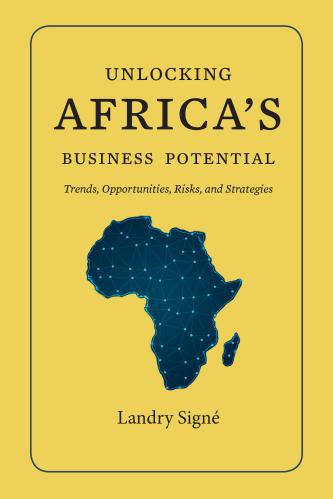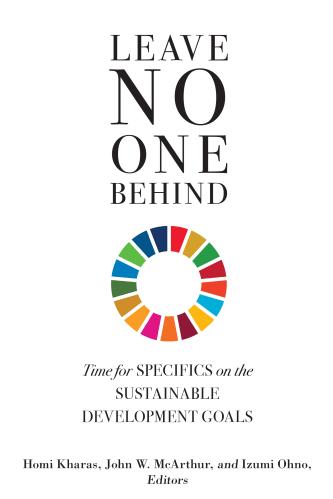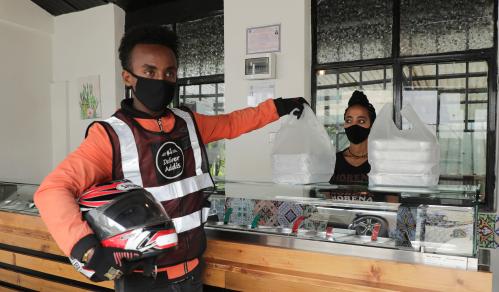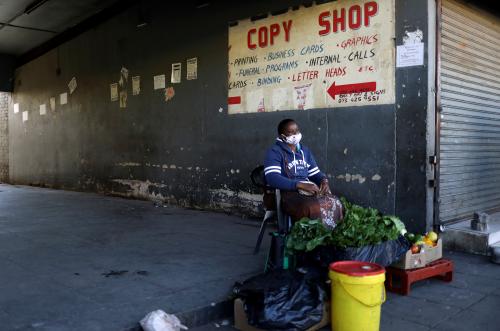US-Kenya bilateral trade agreement moves forward
In late May, the Office of the United States Trade Representative (USTR) released its objectives for initial negotiations of the U.S.-Kenya bilateral trade agreement first announced earlier this year after a meeting between U.S. President Donald Trump and Kenyan President Uhuru Kenyatta. The negotiating objectives cover areas including trade in goods and services, digital trade and cross-border data flows, investment, intellectual property, and the environment, among others. The overall objectives include to “seek a mutually beneficial trade agreement that can serve as a model for additional agreements across Africa,” “support regional integration, where appropriate,” and “build on the objectives of the African Growth and Opportunity Act, promote good governance and the rule of law.” A date has not yet been set for the start of formal trade negotiations.
Progress on the U.S.-Kenya trade agreement also comes as Kenya’s trade with external partners has dropped sharply, largely in response to the COVID-19 pandemic. In April, Kenya’s total trade value declined by nearly $370 million, with exports declining by around $200 million and imports declining by almost $170 million. COVID-19 has also affected Kenya’s trade with neighboring Tanzania; Truck drivers from both countries have been barred from crossing the Kenya-Tanzania border due to a government dispute over COVID-19 clearance certificates. This issue has persisted despite a June 2 meeting between Kenyatta and Tanzanian President John Magufuli intended to resume smooth trade between the two countries.
Border tensions with Ethiopia escalate as Sudan appoints new defense minister
Sudan swore in Major General Yassin Ibrahim Yassin as its new defense minister on Tuesday, two months after the death of his predecessor and amid rising tensions along Sudan’s border with Ethiopia. The formerly retired Yassin was sworn in following an attack in the eastern province of al-Qaadarif, which resulted in the death of one Sudanese soldier and child and the wounding of five others, including one Ethiopian soldier. Sudan’s military alleges that a militia backed by Ethiopia’s military initiated the conflict by trying to take water from the Atbara River in Sudanese territory. Ethiopia’s ministry of foreign affairs released a statement regarding the incident urging the two countries to “work together through existing military mechanisms to address and jointly investigate circumstances surrounding the incident.”
Sudan and Ethiopia share a 1,000-mile border that came about through several colonial-era treaties between Ethiopia, Britain, and Italy. The border is not clearly demarcated, and Ethiopia has for decades permitted its farmers to plant crops in the highly-fertile Al-Fashqa region, which, until recently, was claimed by both Ethiopia and Sudan. Despite recognizing Sudanese sovereignty over the region in April, Ethiopia has yet to remove its military presence in the area.
The border tensions occur against the backdrop of another, unrelated issue that involves these two countries and Egypt: the Grand Ethiopian Renaissance Dam (GERD). Set to become the largest operational dam in Africa, the GERD has been a source of Ethiopian pride and regional discontent since the project was announced in 2011. Sudan has proposed joint management over the dam to assuage fears that the filling of the dam will deplete Sudan’s water supply and to ensure future access to affordable electricity once the dam is in operation. Egypt, more vocal in its remonstrances, fears that filling the dam will have massive consequences for national water supplies and agriculture.
Also this week, the U.N. Security Council announced the establishment of the United Nations Integrated Transition Assistance Mission in Sudan (UNITAMS) to support Sudan’s transition to democratic governance, protect human rights, and facilitate future peace agreements. The U.N. also announced a two-month extension to the African Union-United Nations Hybrid Operation in Darfur (UNAMID) to sustain efforts to mitigate the effects of the pandemic and promote peace in the region.
COVID-19 update
While, as of this writing, Africa has had over 163,000 cases of COVID-19 and over 4,600 deaths, many countries in the region have continued to take steps to open up—meaning the region continues to be a patchwork of policies and health outcomes. For example, on Tuesday, Nigeria opened mosques and churches, but Uganda postponed school openings by another month. Meanwhile, Madagascar and Senegal saw protests and some unrest in opposition to their curfews and other related measures.
In response to its early, soaring number of cases, South Africa took some of the region’s most extreme measures in fighting the virus—likely saving thousands of lives—but is now dealing with the economic consequences. South Africa’s central bank predicts a 7 percent contraction in its economy this year—a reflection of both the COVID-19 crisis and troubles with its state-owned power company Eskom.
South Africa took another step toward opening up its economy this week, partially lifting provisions of its lockdown on June 1. Restaurants, once limited to delivery only, may now offer takeaway services, and alcohol sales can resume. Mining companies—which were permitted to start working at full capacity as of June 1—have begun to push for allowing foreign workers to return to the job, though they are still in talks with the government. While schools were supposed to reopen this week, teachers unions, wary that schools were not appropriately equipped for a safe return, urged their members to stay away. Notably, on June 2, a South African high court ruled that the highest levels of the lockdown regulations are unconstitutional, stating, “The regulations … in a substantial number of instances are not rationally connected to the objectives of slowing the rate of infection or limiting the spread thereof.” However, the court also ruled that its decision would be suspended for 14 days, meaning that lockdown measures will remain in place while the South African government reconsiders the regulations under levels 3 and 4. As of June 1, the country is in level 3.
African airlines—many already facing financial troubles—are also struggling due to the pandemic: Kenya Airways is cutting salaries up to 80 percent, RwandAir plans to enact pay cuts up to 65 percent, and Air Zimbabwe is forcing dozens of staff to go on unpaid leave. The usually profitable Ethiopian Airlines predicts a loss of up to $550 million between January and April alone.







Commentary
Africa in the news: Kenyan trade, Sudan, and COVID-19 updates
June 6, 2020